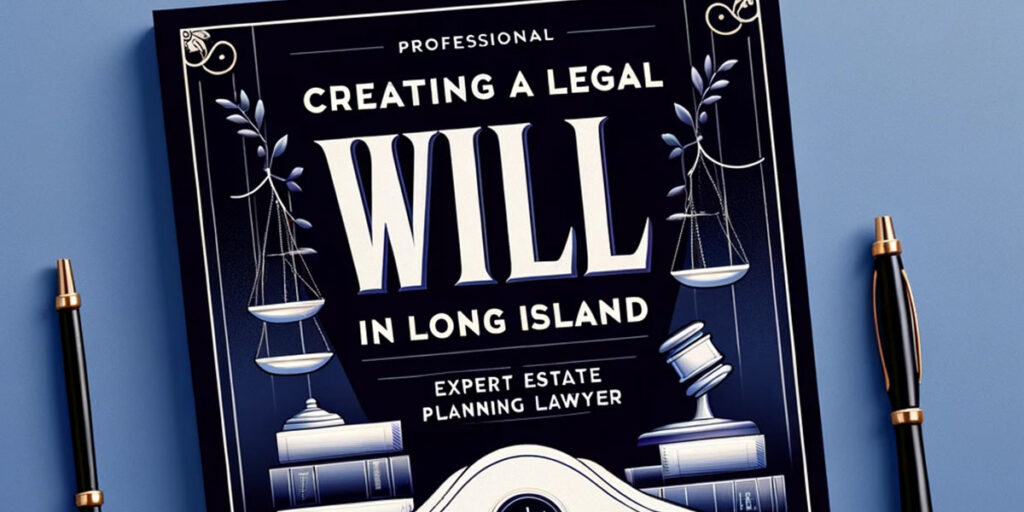Creating a Legal Will in Long Island
Why a Legal Will is Essential
A legal will is a cornerstone of estate planning, ensuring that your assets are distributed according to your wishes after your passing. In Long Island, New York, the complexities of state laws make proper estate planning even more critical. A well-drafted will protect your beneficiaries and minimize potential disputes and legal complications.
Key Elements of a Legally Valid Will in New York
1. Personal Identification
Your will must clearly identify you as the testator. Include your full legal name, address, and any other pertinent identifying information. This eliminates ambiguity about the document’s validity and your intent.
2. Revocation Clause
A will should include a revocation clause declaring that it supersedes all previous wills and codicils. This prevents conflicts between multiple documents and ensures clarity in your estate plan.
3. Beneficiary Designations
Clearly name the individuals or organizations that will inherit your assets. Specify the property or percentage of the estate each beneficiary will receive. This clarity reduces potential disputes and ensures your wishes are followed.
4. Appointment of an Executor
The executor plays a vital role in managing your estate during probate. Choose someone trustworthy and capable of fulfilling legal and financial responsibilities. It’s also wise to name an alternate executor in case the primary is unable to serve.
5. Guardianship for Minors
If you have minor children, appoint a guardian to care for them. This decision ensures your children are cared for by someone you trust, avoiding uncertainty and potential legal battles.
6. Witnesses and Signatures
New York law requires that you sign your will in the presence of at least two witnesses, who must also sign the document. These witnesses should not be beneficiaries to avoid conflicts of interest.
Common Mistakes in Drafting Wills
1. Failing to Update Your Will
Life events like marriage, divorce, or the birth of a child necessitate updates to your will. An outdated will can lead to unintended distributions or legal challenges.
2. Ambiguous Language
Ambiguities in your will can result in disputes among beneficiaries. Clear, precise language is crucial to avoid misinterpretations.
3. Ignoring Tax Implications
Estate and inheritance taxes can significantly affect the value of your assets. A well-drafted report will consider tax strategies to minimize liabilities for your heirs.
Benefits of Hiring an Estate Planning Attorney
While it’s possible to draft a will independently, consulting an experienced estate planning attorney ensures your document complies with New York State laws. Attorneys can provide tailored advice based on your financial situation and family dynamics.
1. Compliance with New York Laws
New York has specific legal requirements for wills. An attorney ensures that your will meets these standards, reducing the risk of being contested or invalid.
2. Addressing Complex Estates
Complex estates involving multiple properties, business interests, or significant financial assets require professional oversight. An attorney can help structure your will to address these complexities effectively.
3. Avoiding Probate Issues
Proper estate planning can streamline or even avoid the probate process. Attorneys can advise on tools like trusts to bypass probate, saving time and reducing stress for your loved ones.
Steps to Create a Legal Will
1. Take Inventory of Your Assets
List all your assets, including real estate, financial accounts, personal property, and investments. Understanding the scope of your estate is crucial for effective planning.
2. Determine Beneficiaries
Decide who will inherit your assets and specify any conditions, such as age requirements for receiving funds.
3. Consult an Attorney
Engage an estate planning attorney to draft your will. They will ensure it meets legal requirements and reflects your wishes accurately.
4. Sign and Execute the Will
Sign the will in the presence of two witnesses, who must also sign. This step is critical for the document’s validity in New York.
Frequently Asked Questions
What happens if I die without a will?
If you pass away intestate (without a will), New York’s intestacy laws determine how your assets are distributed. Typically, this involves close relatives, but it may not align with your preferences.
Can I amend my will after it’s signed?
You can update your will through a codicil or by drafting a new one. Ensure any changes are properly executed to avoid confusion.
How do I store my will?
Store your will in a secure location, such as a fireproof safe or with your attorney. Inform your executor of its location to facilitate access when needed.
Conclusion
Creating a legally valid will in Long Island, New York, is critical in safeguarding your legacy and ensuring your loved ones are cared for. By working with an experienced estate planning attorney, you can navigate New York’s complex legal landscape and craft a comprehensive estate plan tailored to your needs. Contact Morgan Legal Group today to begin the process and secure peace of mind for your future.









